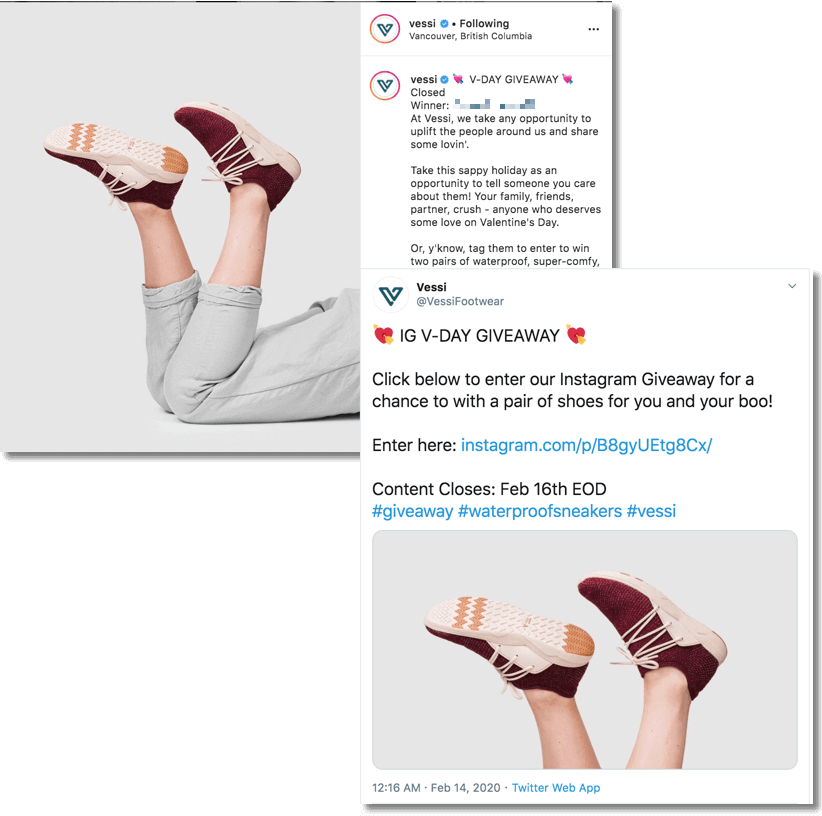Do you know how many small companies operate in the US? At last count, there were 30.2 million companies with less than 500 employees (meaning they are classified as “small businesses”). In fact, this number is constantly increasing worldwide.
If you are a small business owner, you are competing with millions of other businesses for a unique position and place in the market.
How Is Branding Important For Small Business Growth?
Branding relates to creating a company’s name, logo, and design that is easily described as belonging to the company. It helps to identify the product and differentiate it from other products and services. These give you a better option to differentiate yourself from competitors and to be clear about what you are offering.
Your brand is the real representation of who you are as a business and how you want to be understood.

The Florist’s Loft is a botanical event space in Toronto. Despite its small social media community, the brand has a strong and consistent presence and brand image, which creates a sense of trust and loyalty. By showcasing their space they generate more consumer demand.
What Does a Reputed Small Business Brand Do?
Branding is about understanding your target market and the competition within the market share. Branding is about reaching potential customers who see you as the sole provider of solutions for their needs. Promotions are key to reaching this customer base, exposing your brand to these customers, and building a brand community.
A strong brand will figure out all the above qualities:
- Deliver the message
- Confirm the brand’s credibility in the market
- Emotionally connect target prospects with products and services
- Motivate the potential buyer to make a purchase
- Create goodwill and loyalty
Intangible Concepts Of Branding: Brand Improves Recognition
Branding is important for your business as it makes customers recognize the products and services you are providing them. The logo is the most important element of the brand, as it is essentially the face of the business.
This is why the professional logo design must be powerful and easy to remember.
Brand Trust for Your Small Business
People often buy from a business that looks shiny and legit.
For example – A small business uses the new company’s logo to give business cards, employee t-shirts, and a professional image of the business exterior. Passersby and others who face the logo can now easily recognize the business as a trusted center in society.
Brand Increases The Business Value
Branding is important when trying to build a future for the business. A well-established brand can add value to the business. It will give more weight to your business in the competitive industry.
Moreover, it makes your business a more attractive investment opportunity due to its well-established market position.
Attract New Customers to Your Small Business
A good brand should have no trouble developing its sponsorship activity. A strong brand image usually means that customers have a positive impression of the business. Because of the familiarity and credibility of the name, they may believe that they can do business with you.
Once the brand is well-established, word of mouth is the most effective advertising strategy in the business. Share on XIn the following example, you can see how The Knot Pillow Store reinforces a strong brand image and reputation through a variety of high-quality social media posts. Their consistent social media voice and focus build trust and engage the customer’s creativity. By showcasing their products in different settings they tap into customer loyalty, build product awareness and improve brand depth.

Brand Creates Employee Satisfaction
The mission of any business is to make the employee feel connected to the business, the brand, and that they are an integral part of the organization. Creating a team environment and sharing common goals is important. When employees work in a strong brand company, they are more satisfied and take more pride in their work.
In many cases, increasing employee satisfaction and creating brand teams can be achieved by using promotional products on your desktop.

Toyota Finance looked to reward its best insurance dealers at the beginning of the year. Once a seller closed five new motor vehicle insurance policies they got to spin a prize wheel. Their hard work was rewarded with cinema tickets, Kindles, chocolates, and vacuums. It’s a powerful example of how desktop promotions can motivate employees and boost morale.
[hubspot type=cta portal=19559696 id=66fd72ec-bc97-4fb5-84b5-e35b10a531f5]
Brand Supports Advertising
Advertising is another component of branding. The advertising strategy directly reflects the brand and presents your business in front of the customers.
Use the promotional products of outstanding companies, such as outsourced branding from advertising techniques. It makes it easy to develop an integrated and attractive advertising strategy that best fits your branding goals.
Where Does Branding Stand?
- For a successful brand, you must know the demands and expectations of your customers. You can do this by integrating your brand strategies across the company at each public point of contact.
- For example: Consider branding your business or organization as a living breathing person. Imagine this person (your brand) explaining who they are, why they are precious, and what they have to offer in particular.
- As consumers begin to identify your brand, it remains at the top of mind of customers. Promotions and contests reinforce the brand, building on the customer relationship.
Checklist to Evaluate Your Brand
How to know whether your brand is strong enough to give the value you need?
Start by asking yourself:
- Is this brand relevant to my target audience? Will the customer “get it” without much thought?
- Does this brand share the uniqueness I am offering?
- Does the brand reflect the promise I made to my target audience and have value to my internal audience?
- Is the brand reflecting the values that I want to represent for consumers?
How Is Marketing Important For Small Business Growth?
Marketing Research is an amalgamation of all the activities that you will do to bring business products and services in front of potential customers.
The success of small businesses depends on the ability of business owners to sell their products and services. Your marketing strategy must be fruitful to keep your small business alive. It sends a message to potential customers and encourages them to test their company.
For example, you have established the most incredible garden the world has ever seen. Every bud blooms as all the flowers blossom, the leaves are the most vibrant green you have ever seen. To share these beautiful flowers with the world, you collect them into bouquets and stack them in enough vases.
Then, you go outside to sell your flower bouquets. You write your name in front of the shop, place the logo, and then what’s next?
You can only target those who pass by to admire your colors. At the end of the day, you still have a full table of flowers. Businesses need a traffic generator, digitally. They must market to create awareness that they are there and reach people who are looking for what they are selling.
This is why marketing is so important to small businesses. Without accurate and engaging marketing, its scope is extremely limited.
Adelaide Florist put their bets on an interactive solution, a branded Word Search game. They promoted their small businesses with a gamified promotion on social media, in which they raffled a $50 bouquet.

Users looked for 10 flower names hidden in the Word Search. Upon completing the game the users shared their contact details in order to join the raffle. Thanks to the integrated registration form the organizing company could not only contact the winner but also expand their mailing list for future marketing purposes.
Learn here the concept of strategic marketing.
What is Strategic Marketing?
- Identify product needs through consumer research, and observe and quantify sales patterns of similar merchandise.
- Modify existing products or create new ones to meet the needs and desires of your consumers.
- Decide how to reach out to potential customers, so they become aware of your products and buy them.
- Create marketing campaigns based on your findings on how to reach customers more effectively.
- Confirm customer relationships through follow-up sales campaigns and loyalty programs.
Marketing Informs The Consumer
At a basic level, marketing guides your potential customer about the products and services of your business. However, if your customer does not understand what you are selling, it is of no use.
In order to attract customers from a crowded market, your target audience needs to know why they prefer your company over others. This is where marketing comes in to inform current and potential customers about your company and its needs.
Therefore, marketing is a powerful way to increase the value of your business services and products in an interesting manner.
Marketing Equalizes The Market
Marketing is a type of playground for all small and medium-sized businesses. It helps them to apply different strategies and ideas to their own niche competitors.
Modern marketing is a cheaper game than ever before. Email marketing campaigns and Social media platforms have made it a more affordable option to contact customers. Intelligent marketing can also improve competitive conditions with known competitors.
Some even say that small and medium-sized companies have an advantage. They have more time to focus on each customer individually through different marketing platforms.
Modern consumers experience more than prices, so one-on-one conversations like this can push customers toward big brands in your direction.
Marketing Sustains The Company Existence
According to a survey, marketing is more like food than medicine. In essence, marketing is about maintaining a company’s existence, not overcoming a lack of engagement.
However, marketing allows businesses to create and maintain a healthy relationship with their customers every day. It is not a one-off solution, but rather an ongoing strategy that helps companies to prosper.
Marketing Engages More Customers
Customer engagement is essential to the success of small businesses. It allows you to convey your message and attract potential customers. You don’t have to bring people to the store like in the past, you can hire people on multiple platforms via e-commerce, social media, and more.
Jennison Grigsby moved her yoga business online during the pandemic lockdowns. She looked for a way to appeal to more online users and attract them to her digital yoga lessons.

Yoga with Jennison launched a social media giveaway, in which Jennison raffled a 60-minute online session for three. Apart from boosting engagement and growing her social media following, she also gained new customers who found her thanks to the Instagram giveaway.
Marketing keeps customers busy beyond store hours, it is also about building a brand and then nurturing the customer’s relationship with that brand.
Marketing Sells More Products
While opening a store near you, it can give a kick-start to it. The marketing expands your options and draws attention to what you’re selling so people can buy it.
The foundation of any business is earning money and marketing is an essential channel to reach that ultimate goal. Creatives explain that since marketing ultimately increases sales, so there is no more business without it.
Sure, you have a good product, but if people don’t know about your offerings, how can you sell? Simply it is not possible.
Marketing Grows The Organization
This marketing function is partly the conclusion of the first four. Strategic marketing leads to the growth of your company. If you successfully train customers, retain them, build a good reputation in their heads, and sell them wisely, your company will probably do better.
In addition, most companies thrive on gaining new customers. With marketing, you primarily attract these customers. Marketing essentially secures the future of your company through new and old customer loyalty.
Social media engages millions of active monthly users, which makes online platforms the perfect place to showcase products and attract potential customers and new community members. Vessi – a Canadian footwear start-up – turned to sweepstakes in an attempt to boost their brand and sales.

Regular comment-to-win giveaways grew a strong community and helped Vessi become the industry benchmark for waterproof footwear.
Would you like to find out more about the giveaways organized by Vessi? Head to the case study to discover more details.
Marketing Create Needs
Marketing not only defines the needs of the consumers, but also helps in creating the needs of the consumers. It really starts with the understanding of your potential user.
Many marketing campaigns are based on creating awareness of a product and the desire to do this product themselves. The important thing is that this awareness creates needs.
Different Marketing Tools
Marketing can be accomplished from a variety of online and offline methods.
- SEO
- Social Media Marketing
- Content Marketing
- Pay Per Click Marketing
- Mobile Marketing
- Print Campaigns
- Television
- Radio
At Which Place Branding and Marketing Overlap?
Although branding and marketing differ, there is one area where they overlap. Branding and marketing stand side by side to each other, and the strategies strategies become one whenever they are used on a daily basis.
As the saying goes, “The picture says a thousand words.” Thinking this thing in mind, if you select your company’s colors, logos, and graphics, then make sure that these things represent your brand first.
The Final Verdict
I hope that your concept of branding and marketing is understandable in the real world. The power of branding is to be closer to the consumer, not a real service or product.
It’s branding that explains to customers who you are. Meanwhile, branding can give your businesses more than just providing certain types of service or creating products.
At the same time, marketing is essential to attract and engage customers with your brand. Understanding branding and marketing can help you build a solid foundation for your small business.